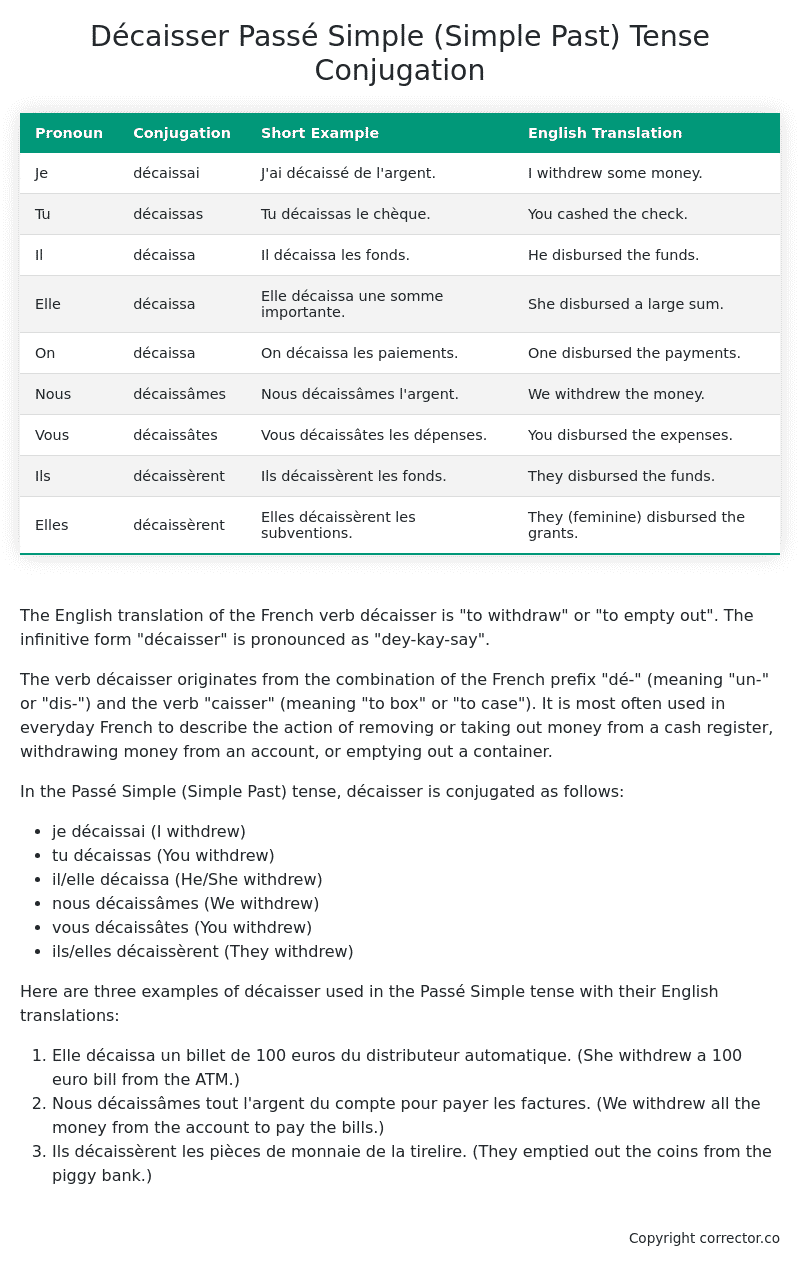Passé Simple (Simple Past) Tense Conjugation of the French Verb décaisser
Introduction to the verb décaisser
The English translation of the French verb décaisser is “to withdraw” or “to empty out”. The infinitive form “décaisser” is pronounced as “dey-kay-say”.
The verb décaisser originates from the combination of the French prefix “dé-” (meaning “un-” or “dis-“) and the verb “caisser” (meaning “to box” or “to case”). It is most often used in everyday French to describe the action of removing or taking out money from a cash register, withdrawing money from an account, or emptying out a container.
In the Passé Simple (Simple Past) tense, décaisser is conjugated as follows:
- je décaissai (I withdrew)
- tu décaissas (You withdrew)
- il/elle décaissa (He/She withdrew)
- nous décaissâmes (We withdrew)
- vous décaissâtes (You withdrew)
- ils/elles décaissèrent (They withdrew)
Here are three examples of décaisser used in the Passé Simple tense with their English translations:
- Elle décaissa un billet de 100 euros du distributeur automatique. (She withdrew a 100 euro bill from the ATM.)
- Nous décaissâmes tout l’argent du compte pour payer les factures. (We withdrew all the money from the account to pay the bills.)
- Ils décaissèrent les pièces de monnaie de la tirelire. (They emptied out the coins from the piggy bank.)
Table of the Passé Simple (Simple Past) Tense Conjugation of décaisser
| Pronoun | Conjugation | Short Example | English Translation |
|---|---|---|---|
| Je | décaissai | J’ai décaissé de l’argent. | I withdrew some money. |
| Tu | décaissas | Tu décaissas le chèque. | You cashed the check. |
| Il | décaissa | Il décaissa les fonds. | He disbursed the funds. |
| Elle | décaissa | Elle décaissa une somme importante. | She disbursed a large sum. |
| On | décaissa | On décaissa les paiements. | One disbursed the payments. |
| Nous | décaissâmes | Nous décaissâmes l’argent. | We withdrew the money. |
| Vous | décaissâtes | Vous décaissâtes les dépenses. | You disbursed the expenses. |
| Ils | décaissèrent | Ils décaissèrent les fonds. | They disbursed the funds. |
| Elles | décaissèrent | Elles décaissèrent les subventions. | They (feminine) disbursed the grants. |
Other Conjugations for Décaisser.
Le Present (Present Tense) Conjugation of the French Verb décaisser
Imparfait (Imperfect) Tense Conjugation of the French Verb décaisser
Passé Simple (Simple Past) Tense Conjugation of the French Verb décaisser (You’re reading it right now!)
Passé Composé (Present Perfect) Tense Conjugation of the French Verb décaisser
Futur Simple (Simple Future) Tense Conjugation of the French Verb décaisser
Futur Proche (Near Future) Tense Conjugation of the French Verb décaisser
Plus-que-parfait (Pluperfect) Tense Conjugation of the French Verb décaisser
Passé Antérieur (Past Anterior) Tense Conjugation of the French Verb décaisser
Futur Antérieur (Future Anterior) Tense Conjugation of the French Verb décaisser
Subjonctif Présent (Subjunctive Present) Tense Conjugation of the French Verb décaisser
Subjonctif Passé (Subjunctive Past) Tense Conjugation of the French Verb décaisser
Subjonctif Imparfait (Subjunctive Imperfect) Tense Conjugation of the French Verb décaisser
Subjonctif Plus-que-parfait (Subjunctive Pluperfect) Tense Conjugation of the French Verb décaisser
Conditionnel Présent (Conditional Present) Tense Conjugation of the French Verb décaisser
Conditionnel Passé (Conditional Past) Tense Conjugation of the French Verb décaisser
Conditionnel Passé II (Conditional Past II) Tense Conjugation of the French Verb décaisser
L’impératif Présent (Imperative Present) Tense Conjugation of the French Verb décaisser
L’impératif Passé (Imperative Past) Tense Conjugation of the French Verb décaisser
L’infinitif Présent (Infinitive Present) Tense Conjugation of the French Verb décaisser
L’infinitif Passé (Infinitive Past) Tense Conjugation of the French Verb décaisser
Le Participe Présent (Present Participle) Tense Conjugation of the French Verb décaisser
Le Participe Passé (Past Participle) Tense Conjugation of the French Verb décaisser
Struggling with French verbs or the language in general? Why not use our free French Grammar Checker – no registration required!
Get a FREE Download Study Sheet of this Conjugation 🔥
Simply right click the image below, click “save image” and get your free reference for the décaisser Passé Simple tense conjugation!

Décaisser – About the French Passé Simple (Simple Past) Tense
Formation
Usage
Narration
Historical Context
Interactions with other tenses
Passé Composé
Imparfait
Conditional and Subjunctive
Summary
I hope you enjoyed this article on the verb décaisser. Still in a learning mood? Check out another TOTALLY random French verb conjugation!


